- Home
- Scott Turow
Testimony
Testimony Read online
This book is a work of fiction. Names, characters, places, and incidents are the product of the author’s imagination or are used fictitiously. Any resemblance to actual events, locales, or persons, living or dead, is coincidental.
Copyright © 2017 by Scott Turow
Cover design by Flag
Cover photograph of crumpled sheet of paper by Larry Washburn/Getty Images
Cover copyright © 2017 by Hachette Book Group, Inc.
Hachette Book Group supports the right to free expression and the value of copyright. The purpose of copyright is to encourage writers and artists to produce the creative works that enrich our culture.
The scanning, uploading, and distribution of this book without permission is a theft of the author’s intellectual property. If you would like permission to use material from the book (other than for review purposes), please contact [email protected]. Thank you for your support of the author’s rights.
Grand Central Publishing
Hachette Book Group
1290 Avenue of the Americas, New York, NY 10104
grandcentralpublishing.com
twitter.com/grandcentralpub
First Edition: May 2017
Grand Central Publishing is a division of Hachette Book Group, Inc. The Grand Central Publishing name and logo is a trademark of Hachette Book Group, Inc.
The publisher is not responsible for websites (or their content) that are not owned by the publisher.
The Hachette Speakers Bureau provides a wide range of authors for speaking events. To find out more, go to www.hachettespeakersbureau.com or call (866) 376-6591.
Library of Congress Cataloging-in-Publication Data has been applied for.
ISBN: 978-1-4555-5354-9 (hardcover), 978-1-5387-5996-7 (signed edition), 978-1-4555-7118-5 (large print hardcover), 978-1-4555-5352-5 (ebook), 978-1-4789-1849-3 (international paperback)
Printed in the United States of America
E3-20170127-DA-NF
Table of Contents
Cover
Title Page
Copyright
Dedication
Prologue: 5 March 2015
I.: The Hague 1.: Reset—8 January 2015
2.: The Hague—2 March 2015
3.: Going to Work—March 3–4
II.: Moving 4.: The Order
5.: Settling In—March 11–April 8
6.: Merriwell—April 10
7.: Dining
III.: Bosnia 8.: Attila—April 11–15
9.: The Blue Lamp
10.: Barupra—April 16
11.: Lijce
12.: Still a Gypsy
13.: Regret
IV.: For the Record 14.: Records—April 16–23
15.: Leiden—April 24–26
16.: The Lab—April 29
17.: A Meeting—April 27–May 10
18.: Deal—May 15–28
V.: Trouble 19.: Home Run—May 30–June 1
20.: Buried Again—June 2
21.: Back to the Salt Mine
22.: Why—June 3–4
VI.: Kajevic 23.: Who’s There?—June 4–9
24.: Now in Person—June 10
25.: Home to The Hague—June 10–13
26.: New Witness—June 15–16
27.: Emira—June 17–19
28.: Kajevic—June 23
VII.: In the Cave 29.: War and Truth—June 26–27
30.: The Cave—June 29–July 2
31.: Fallacies—July 3–6
32.: Home?—July 6–7
VIII.: Breaking the Law 33.: Foley Square—July 9
34.: OTR—July 9–10
35.: Foreign Voices—July 10–11
36.: Bad Person—July 11
Author’s Note
Also by Scott Turow
About the Author
For Adriane
Prologue
5 March 2015
“There were men,” said the witness. He was lean and dark, the color of an acorn, and seated beside his lawyer at the small table reserved for testimony, he appeared as tense as a sprinter on the starting line.
“How many men?” I said.
“Eighteen?” he asked himself. “More. Twenty? Twenty,” he agreed.
The witness’s name was Ferko Rincic, but in the records of the International Criminal Court, he would be identified solely as Witness 1. To protect him, a shade closed off the spectators’ section in the large courtroom, and electronically distorted versions of Ferko’s voice and image were being transmitted to the few onlookers, as well as over the Internet. Standing several feet away at the prosecutor’s table, I had just commenced my examination with the customary preliminaries: Ferko’s age—thirty-eight, he said, although he looked far older—and where he lived on April 27, 2004, which was the place they called Barupra in Bosnia.
“And about Barupra,” I said. “Did anyone share your house with you?”
Ferko was still turning to the right at the sound of the translator’s voice in his headphones.
“My woman. Three daughters. And my son.”
“How many children in all did you have?”
“Six. But two daughters, they already had men and lived with their families.”
I picked up a tiny photo, creased and forlorn with wear.
“And did you provide me with an old photograph of your family when you arrived this morning?”
Rincic agreed. I announced that the photo would be marked as Exhibit P38.
“Thirty-eight?” asked Judge Gautam, who was presiding. She was one of three judges on the bench, all watching impassively in their black robes, resplendent with cuffs and sashes of royal blue. Following the Continental custom, the same odd white linen cravat I also wore, called a ‘jabot,’ was tied beneath their chins.
“Now let me call your attention to the computer screen in front of you. Is that photo there, P38, a fair resemblance to how your family looked on April 27, 2004?”
“Daughter third, she was already much taller. Taller still than her mother.”
“But is that generally how you all appeared back then, you and your wife and those of your children still at home?”
He peered at the monitor again, his expression shrinking in stages to some form of resignation before at last saying yes.
I began another question, but Rincic suddenly stood up behind the witness table and waved at me, remonstrating in Romany, words the translator was too surprised to bother with. It took me an instant, therefore, to realize he was concerned about his photo. Esma Czarni, the English barrister who had initially brought Ferko’s complaint here to the International Criminal Court, rose beside him, drawing her torrents of dark hair close enough to briefly obscure Ferko while she sought to calm him. In the meantime, I asked the deputy registrar to return the old snapshot. When she had, Ferko studied it another second, holding it in both hands, before sliding the picture into his shirt pocket and resuming his place next to Esma.
“And in P38, is that your house directly behind you?”
He nodded, and Judge Gautam asked him to answer out loud, so the court reporter could record his response.
“And what about these other structures in the background?” I asked. “Who lived in those houses?” ‘House’ was generous. The dwellings shown were no better than lean-tos, each jerry-rigged from whatever the residents of Barupra had salvaged. Timbers or old iron posts had been forced into the ground and then draped most commonly with blue canvas tarpaulins or plastic sheeting. There were also chunks of building materials, especially pieces of old roofs, which had been scavenged from the wreckage of nearby houses destroyed in the Bosnian War. That war had been over for nine years in 2004, but there was still no shortage of debris, because no one knew which sites had been booby-trapped or mined.
“The People,”
answered Ferko, about his neighbors.
“And is the word in Romany for ‘the People’ ‘Roma’?”
He nodded again.
“And to be clear for the record, a more vulgar word in English for the Roma is ‘Gypsies’?”
“‘Gypsy,’” Ferko repeated with a decisive nod. That might well have been the only word of English he knew.
“Well, we’ll say ‘Roma.’ Was it only Roma who lived in Barupra?”
“Yes, all Roma.”
“How many persons approximately?”
“Four hundred about.”
“And now let me ask you to look again at the computer screen. This will be Exhibit P46, Your Honors. Is that roughly how the village of Barupra appeared during the time you lived there?”
Esma had secured a couple of photos of Barupra and the surrounding area, taken in 2000 by one of the international aid agencies. The picture I was displaying showed the camp from a distance, a collection of ragged dwellings clinging together at the edge of a forbidding drop-off.
“And how long had you and the other Roma lived there?”
Ferko seesawed his head. “Five years?”
“And where had you and your family and the other people in Barupra—where had you been before that, if you can say?”
“Kosovo. We ran from there, 1999.”
“Because of the Kosovo War?”
“Because of the Albanians,” he answered with another dismal wobble of his head.
“So let us return then to the late hours of 27 April, 2004. About twenty men appeared in the Roma refugee camp at Barupra in Bosnia, correct?” We waited again for the laborious process of translation to unfold a floor above the courtroom, where the interpreters were positioned behind a window. My questions were transformed first from English to French—the International Criminal Court’s other official language—and then by a second translator into Romany, the Roma’s own tongue. The answer came back the same way, like a wave rippling off the shore, finally reaching me in the female translator’s plummy British accent. This time, though, the process was short-circuited.
“Va,” answered Rincic in Romany as soon as he heard the question in his language, adding an emphatic nod. We all understood that.
“And what nature of men were they?” I asked. “Did they appear to have any profession?”
“Chetniks.”
“And please describe to the Court what you mean by that word.”
I leaned down to Goos, the tall red-faced investigator assigned to the case, who was seated next to me at the foremost prosecutor’s desk.
“What the hell is a Chetnik?” I whispered. Up until that moment I had thought I was doing fairly well, having been on the job all of three days. There was nothing here I was familiar with—the courtroom, my colleagues, or the rigmarole of the International Criminal Court with its air of grave formality. The black robe I wore and the little doily of a tie beneath my chin made me feel as if I were in a high school play. This was also the first time in my life I had examined my own witness without the opportunity to speak to him in advance. I had first met Ferko Rincic in the corridor, only seconds before Esma escorted him into the courtroom. He had gripped the hand I offered merely by the fingertips in a mood of obvious distrust. I did not need anyone to tell me he would rather not have been here.
“They are supposed to be soldiers,” said Ferko of the Chetniks. “Mostly they are just killers.”
By now, Goos had inscribed his own note concerning the Chetniks in his uneven script on the pad between us: “Serb paramilitaries.”
“And how were these Chetniks dressed?” At the witness table, Rincic himself wore weathered twill trousers, a collarless white shirt, a dark vest, and a yellowish porkpie hat, which none of us had thought to tell him to remove in the courtroom. All of it—his long crooked nose that appeared to have been broken several times, his hat, and his thick black mustache, which might have been a smear of greasepaint—made Ferko resemble a lost child of the Marx brothers.
“Army uniform. Fatigues. Flak jackets,” Ferko said.
“Were there any insignia or other identification on their uniforms?”
“Not so I remember.”
“Were you able to see their faces?”
“No, no. They were masked. Chetniks.”
“What kind of masks? Could you make out any of their features?”
“Balaclavas. Black. For skiing. You saw only the eyes.”
“Were they armed?”
Again Rincic nodded. To reemphasize the need to answer aloud, Judge Gautam created a broadcast thump by tapping on the silver microphone stalk that rose in front of her, as well before Rincic and me, and at forty other seats in the rows of desks ringing the bench. Those spots were normally reserved for defense lawyers and victims’ representatives, but they had no occupants for today’s pre-trial proceeding, in which the prosecutor was the lone party.
The large courtroom was a pristine exercise in Dutch Modern, perhaps a hundred feet wide, with a bamboo floor, and furnishings and wainscoting in yellowish birch, the color of spicy mustard. The design impulse had favored the basic over the grand. Decorative elements were no more elaborate than wooden screens on the closed fronts of the desks and on the wall behind the judges, where the round white seal of the International Criminal Court also appeared.
Once Ferko had said yes, I asked, “Did you recognize the weapons they carried?”
“AKs,” he answered. “Zastavas.”
“Would that be the Zastava M70?” It was the Yugoslav Army version of the AK-47.
“And how is it that you can recognize a Zastava, sir?”
Ferko raised his hands futilely, while his face once more swam through a series of bereft expressions.
“We lived in those times,” he said.
Goos called up a photo of the weapon on the computer screens, which rose around the courtroom, beside the microphones. It was a Kalashnikov-style assault rifle with a folding stock and a long wooden handguard above the curved ammunition magazine that projected with phallic menace. I had first seen Zastavas years ago in Kindle County, when I was prosecuting street gangs who were frequently better armed than the police.
“Now when the Chetniks arrived, where were you situated? Were you in your house?”
“No. I was in the privy.” I already suspected the translator, with her upper-class accent, was significantly enhancing Ferko’s grammar and word choice. Based on my very brief impression of him, I was fairly certain he had not said anything remotely like ‘privy.’
“And why were you in the privy?”
When this question finally reached Ferko, he jolted back in surprise and slowly lifted his palms. Laughter followed throughout the courtroom—from the bench, the registry staff seated below the judges, and my new colleagues from the Office of the Prosecutor, a dozen of whom were at the desks behind me to watch this unprecedented hearing.
“Let me withdraw that silly question, Your Honors.”
Goos, with his ruddy round face, was smiling up at me in good fellowship. The moment of comedy seemed to have suited everyone well.
“If I may lead, Your Honors: Had a need awakened you, Mr. Witness, and brought you to the privy in the middle of the night?”
“Va,” said Rincic and patted his tummy.
“Now, if you were in the privy, sir, how were you able to see these Chetniks?”
“At the top of the door, there is a space. For air. There is a footstool in the privy. When I first heard the commotion as they came into the village, I opened the door a slice. But once I saw it was Chetniks, I locked the door and stood on the stool to watch.”
“Was there any light in the area?”
“On the privy, yes, there was a small light with a battery. But there was some moon that night, too.”
“And were you alone in the privy throughout the time you saw or heard the Chetniks?”
Several people around the courtroom giggled again, thinking I had once more stubbed my toe on
the obvious.
“At first,” Ferko said. “When the running and screaming started, I saw my son wander by. He was lost and crying, and I opened the door very quick and brought him in there with me.”
“And how old was your son?”
“Three years.”
“And once you had grabbed your son, what did you do?”
“I covered his mouth to keep him quiet, but once he knew he couldn’t talk, I stood again on the stool.”
“I want to ask you about that point in time when the screaming started. But before I do, let me turn to other things you might have heard. First of all, these Chetnik soldiers, did they speak at all?”
“Va.”
“To the People or to themselves or both?”
“Both.”
“All right. Now how did they speak to the People?”
“One had an electronic horn.” He meant a power bullhorn.
“And what language did that soldier speak?”
“Bosnian.”
“Do you speak Bosnian?”
He shrugged. “I understand. It is somewhat like they speak in Kosovo. Not the same. But I understand mostly.”
“And did he sound like other Bosnians you had heard speaking?”
“Not completely. Right words. Like a schoolteacher. But still, on my ear, it was not right.”
“Are you saying he had a foreign accent?”
“Va.”
“And did the Chetniks speak to one another?”
“Very little. Mostly it was with the hands.” Ferko raised his own slim fingers and beckoned in the air to demonstrate.
“They used hand signals?” There was a pause overhead. The term ‘hand signal’ apparently did not have an obvious equivalent in Romany. Eventually, though, Ferko again said yes.
“Did you hear the soldiers say anything to one another?” I asked.
“A few whispers when they were near the privy.”
“And these words—what language was that?”
“I don’t know.”

 Testimony
Testimony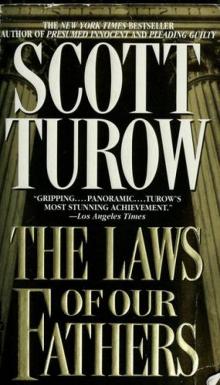 The Laws of Our Fathers
The Laws of Our Fathers Ordinary Heroes
Ordinary Heroes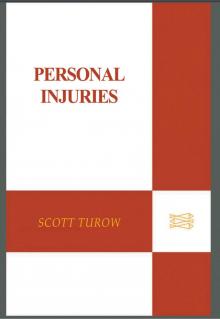 Personal Injuries
Personal Injuries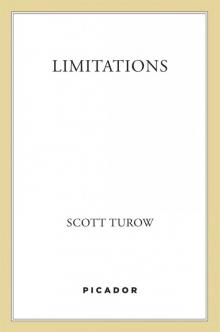 Limitations
Limitations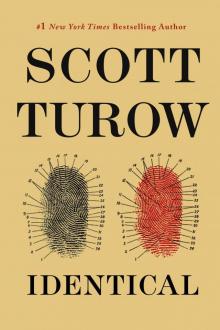 Identical
Identical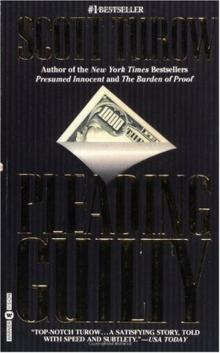 Pleading Guilty
Pleading Guilty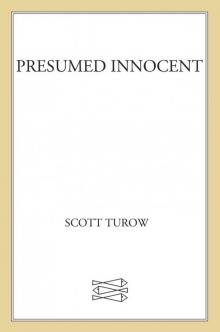 Presumed Innocent
Presumed Innocent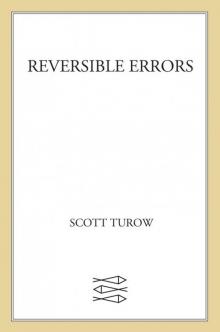 Reversible Errors
Reversible Errors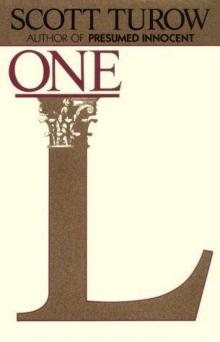 One L: The Turbulent True Story of a First Year at Harvard Law School
One L: The Turbulent True Story of a First Year at Harvard Law School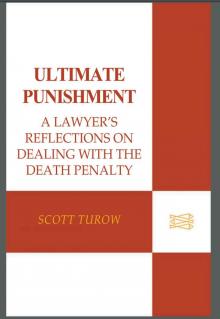 Ultimate Punishment
Ultimate Punishment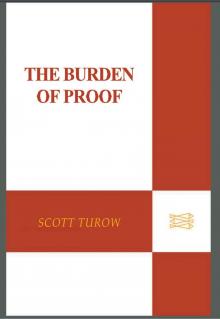 The Burden of Proof
The Burden of Proof Ordinary Heroes (2005)
Ordinary Heroes (2005)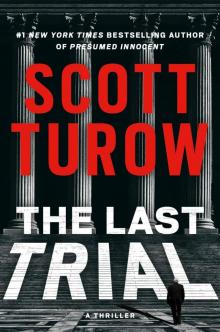 The Last Trial
The Last Trial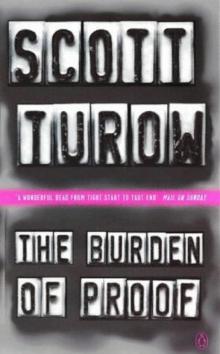 The Burden of Proof kc-2
The Burden of Proof kc-2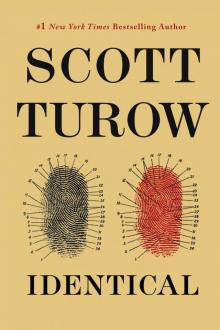 KC09 - Identical
KC09 - Identical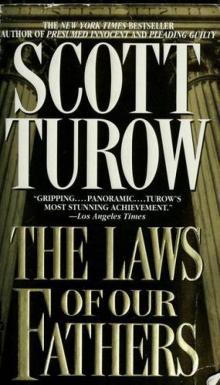 The Laws of our Fathers kc-4
The Laws of our Fathers kc-4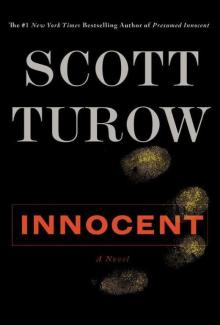 Innocent kc-8
Innocent kc-8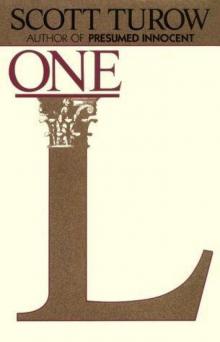 One L
One L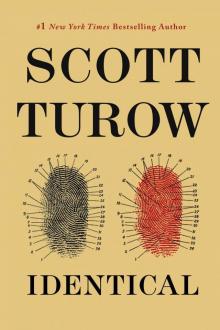 Identical kc-9
Identical kc-9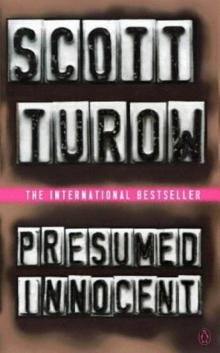 Presumed innocent kc-1
Presumed innocent kc-1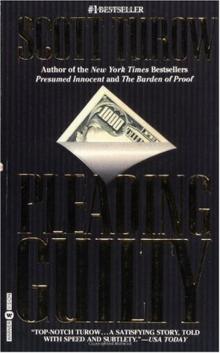 Pleading Guilty kc-3
Pleading Guilty kc-3 One L (1977)
One L (1977)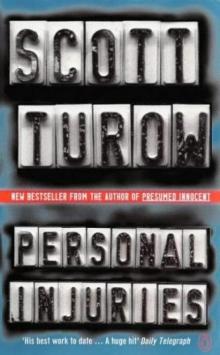 Personal injuries kc-5
Personal injuries kc-5